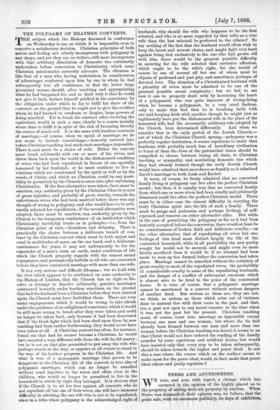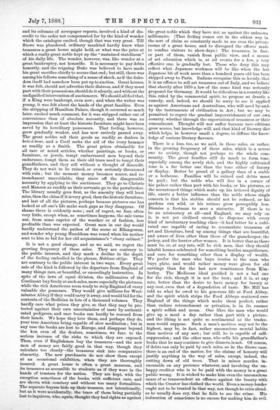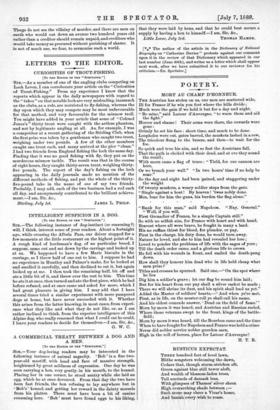PEERS AND AUCTIONEERS.
WIA note, and note with regret, a change which has occurred in the opinion of the highly placed as to the propriety of selling their art property by auction. When Stowe was dismantled, their opinion was, we believe, that the great sale, with its enormous publicity, its days of exhibition, and its columns of newspaper reports, involved a kind of dis- credit to the order not compensated for by the kind of wonder which the catalogue excited, though that was very great. Till Stowe was plundered, ordinary mankind hardly knew what treasures a great house might hold, or what was the price at which a really great noble kept up the "sustained stateliness" of his daily life. The wonder, however, was, like wonder at a great bankruptcy, not honorific. It is necessary to pay debts honestly, and the reigning Duke was believed to have made his great sacrifice chiefly to secure that end; but still, there was among his fellows something of a sense of shock, as if the duke- dom itself had somehow been put up to auction. Great houses, it was felt, should not advertise their distress, and if they must part with their possessions, should do it silently, and without the undignified intervention of auctioneers. We should all feel that, if a King were bankrupt, even now; and when the writer was young, it was felt about the heads of the great families. Even the stripping of Hamilton Palace, though it occurred so much later, excited much comment, for it was stripped rather out of convenience than of absolute necessity, and there was an impression that at least the historic furniture might have been saved by its hereditary possessors. That feeling, however, grew gradually weaker, and has now entirely passed away. The great nobles sell their goods as readily as dealers in brie-it-brae, and a Cecil seeks the aid of the ivory hammer as readily as a Smith. The great prices obtainable for all rare or noted articles, whether paintings, or books, or furniture, or jewels, tempt embarrassed men beyond their endurance, tempt them as their old trees used to tempt their grandfathers, and they sell without a thought of discredit. They do not wait to be rained, or even seriously threatened with ruin ; but the moment money becomes scarce, and re- trenchment unavoidable, they stave of the disagreeable necessity by applying to the auctioneer. They go to Christie and Manson as readily as their servants go to the pawnbroker. The library usually goes first, as the amenity they will least miss, then the china if it is very good, then the historic furniture, and last of all the .pictures, perhaps because pictures one has looked at all one's life make such gaps as they disappear. Of shame there is evidently none ; and of regret, we fear, often very little, except when, as sometimes happens, the sale turns out, from some caprice of the weather or of fashion, less profitable than was expected. Great men in our day would hardly understand the pathos of the scene at Ellangowan, and wonder why young Hazeldean was vexed when his mother sent to him to bid for her old acquaintance's "ebony cabinet."
It is not a good change, and as we said, we regret the growing frequency of these sales. They are contrary to the public interest, and they mark a decline in the depth of the feeling embodied in the phrase, Noblesse oblige. They are contrary to the public interest in two ways. Every great sale of the kind is followed by the departure from England of many things rare, or beautiful, or exceedingly instructive. In spite of the laws of equal division, the millionaires of the Continent buy freely at such sales, more especially the pictures, while the rich Americans seem ready to strip England of every valuable she possesses. They would give millions for West- minster Abbey if they could carry it away, and would bid for the contents of the Bodleian in lots of a thousand volumes. They hardly care what prices they give, so that they may be pro- tected against their own uncertainties of taste by authenti- cated pedigrees, and rare books can hardly be rescued from their hands. We hope they love them, and perhaps they do, your true American being capable of slow meditation ; but in any case the books are lost to Europe, and disappear beyond the ken even of the dealers, sometimes, we fear, to the serious increase of the risks to which they are exposed. Then, even if Englishmen buy the treasures—and the new men of money are fairly good in that way, though they calculate too closely—the treasures sink into comparative obscurity. The new purchasers do not show them except at an occasional exhibition, when they are thoroughly insured. A great house is often a great museum, and its treasures as accessible to students as if they were in the hands of trustees for the nation. They are kept, with the exception sometimes of the books, with sufficient care, and are shown with courtesy and without too many formalities. The separate buyers hide up their tresures, not intentionally, but as it were accidentally, the trace of them being partially lost to inquirers, who, again, thought they had rights as against
the great noble which they have mint as against the unknown millionaire. (That feeling comes out in the oddest way in the sort of claim so constantly made to see even the private rooms of a great house, and to disregard the efforts made to confine visitors to show-days.) The treasures, in fact, or part of them, vanish from public view, and a means
of art education which is, at all events for a few, a very effective one, is gradually lost. Those who deny this may reflect what Japanese workmen will be like when the last Japanese bit of work more than a hundred years old has been shipped away to Paris. Italinns recognise this so keenly, that it is an offence to sell art treasures out of Italy, and we believe that shortly after 1870 a law of the same kind was seriously proposed for Germany. It would be ridiculous in a country like this, ruled by the commercial spirit, to propose so drastic a remedy, and, indeed, we should be sorry to see it applied as against Americans and Australians, who will need by-and- by the instruments of civilisation in Art ; but we may be permitted to regret the gradual impoverishment of our own country, whether through the exportation of treasures or their concealment. Thought will not suffer because rare editions grow scarce, but knowledge will, and that kind of literary diet which helps, in however small a degree, to diffuse the know- ledge of curious literary flavours.
There is a loss, too, as we said, in these sales, or rather, in the growing frequency of these sales, which is a severe one to society, though not perhaps to the whole com- munity. The great families still do much to form tone, especially among the newly rich, and the highly cultivated tone is a far better one than the tone either of luxury or display. Better be proud of a gallery than of a stable or a hothouse. Families will be ruined and debts must be paid ; but the noble who will live in a corner of his palace rather than part with his books, or his pictures, or the accustomed things which make up his lettered dignity of life, exerts a better influence than the noble whose single concern is that his stables should not be reduced, or his gardens run wild, or his retinue grow perceptibly less. Dismiss a footman to save a statuette. If there is to be an aristocracy at all—and England, we may rely on it, is not yet civilised enough to dispense with every kind of involuntary teaching class—it had better be a culti- vated one capable of caring to accumulate treasures of art and literature, bred up among things that are beautiful, and aware of lives other than those of the gamekeeper, the jockey, and the hunter after women. It is better that as there must be, or, at any rate, will be rich men, that they should inhabit houses celebrated for something besides magnificence, and care for something other than a display of wealth. We prefer the man who buys ivories to the man who buys plate, and would rather money were given for old carvings than for the last new remittances from Kim- berley. The Medicean ideal purified is not a bad one for the rich, though it is not the best; and it is, at any rate, better than the desire to have money for luxury at any cost, even that of a degradation of taste. Mr. Mill has told us what he owed to his generous life at Ford Abbey, and the spirit which strips the Ford Abbeys scattered over England of the things which make them perfect, rather than endure retrenchment Cr privation, is in its essence a spirit selfish and mean. One likes the man who would give up a meal a day rather than part with a picture, and the liking is not quite so sentimental as the trades- man would suppose. Such a man's motives may not be the highest, may be, in fact, rather unconscious mental habits than motives of any sort ; but still, he is capable of self- suppression ; and the other man, who sells his grandfather's books that he may continue to give dinners, is not. Of course, if debts can only be paid by such sales, as in the Stowe case, there is an end of the matter, for the claims of honesty will justify anything in the way of sales, except, indeed, the cutting down of old trees. That is minor murder, in- excusable on any pretence whatever, and involving the un- happy creditor who is to be paid with the money in a great public wrong. It is wicked to make him even the unconscious cause of so transcendent an offence against the beauty with which the Creator has clothed the world. Even a money-lender ought not to be treated in that way, not though he cries aloud, as he usually does cry, that he fails to see the crime. His induration of conscience is no excuse for making him do evil. -Thugs do not see the villainy of murder, and there are men on -earth who would cut down an avenue two hundred years old rather than a creditor should remain unpaid, and creditors who mould take money so procured without perishing of shame. It is not of much use, we fear, to sermonise such a world.




































 Previous page
Previous page